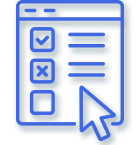What does an Addiction Counselor in Tennessee do? What is Their Job Role?
Drug and alcohol abuse is a raging wildfire in our society. The numbers of addicts and overdoses are staggering, and they continue to rise. Thus, we need more and more substance abuse counselors all the time.
No matter where you live, your state has regulations for licensure as a substance abuse counselor. In many cases, these regulations are rather new and so may still be evolving. However, if you have heard the calling to help the millions of addicts in the world, you can get started on the road to licensure today. Generally speaking, most states require specific academic accomplishments, successful examination scores, and satisfactory completion of an internship under the supervision of a licensed substance abuse counselor. If you are living in Tennessee, this page will detail your specific requirements.
Compare Popular Online Substance Abuse Counseling Programs
Overview
Work as a substance abuse counselor is not easy, but it is infinitely rewarding. In addiction counseling, you will have the opportunity to not only help individual addicts, your impact will be much farther-reaching. Consider that most everyone you know has been touched in some form by the disease of addiction. They may have friends, family members, or coworkers who suffer from the disease and whom are causing them some degree of difficulty. Others might be victims of crimes perpetrated by drug addicts or suffer other negative outcomes from addict behavior.
Work Environment

The work environment of a substance abuse counselor is as varied as the individuals in the profession. A alcohol and drug counselor may choose to work full-time for a drug rehabilitation facility or some other mental health institution. A alcohol and drug counselor could also choose to work in a number of venues, piecing your work-life together in an ad-hoc fashion. A drug abuse counselor could also opt to work in private practice, helping addicts and their families work through the traumas that incited, and stemmed from, the addiction.
You will also find that rehabilitation facilities are not all the same. Some are found on sprawling campuses complete with horse stables, soaking pools, and nature trails. Others are far more bare-bones with patients living in standard apartments and commuting to a center for daily therapies. If you are the outdoors type, you might enjoy working in a wilderness immersion where addicts learn to live closer to nature as way of distancing themselves from a life of drugs and booze.
Still other substance abuse counselors might work part-time in a rehabilitation facility but also perform interventions, teach drug/alcohol awareness courses, and see a few clients in a clinical setting. The choice is up to you. Life as a substance abuse counselor can be as richly varied as you choose.
Duties
Your primary duty as a substance abuse counselor will be to help addicts overcome the causes and conditions that resulted in a life of addiction. This might take many different forms. That is, you could facilitate group therapy with multiple addicts, or specialize in family therapy. Many focus on individual therapy.
If you work in a drug rehabilitation facility, you might find that your days are filled with a variety of tasks. In the morning you might see individual clients, but your afternoons might be filled with group activities, including academic-style courses on relapse prevention, the physical ramifications of psychoactive substances, or life-coping skills. Still others have outside credentials in yoga or meditation and might integrate these sessions into their daily or weekly schedules.
Am I a Good Fit?
Just as the duties of a substance abuse counselor are diverse, so are the personalities that populate the profession. You will want to sit down and ponder your motivations for the profession. While the availability of jobs might be tempting, this is a profession that is very demanding of one's personality. That is, you will need to learn how to distance yourself from your clients enough so that you have an objective view, but not so much that you appear cold or stern. An especially empathetic or compassionate person could easily be taken advantage of by a wily addict, so be realistic with yourself.
One key trait you will need to have is an attitude of tolerance and acceptance. Very often addicts do very bad things. They do shocking things. While their actions might be horrible, you will need to see past those actions to the person sitting before you. Your job will be to help the person heal from the shame associated with those negative behaviors. Imagine a few worst-case scenarios and consider whether you help such a person achieve lasting happiness.
Tennessee Licensing & Certifications for Associates & Independent Counselors
Under Tennessee law, you will become a Licensed Alcohol and Drug Abuse Counselor (LADC.) This designation has two tiers, I & II. Level I is attainable whether you have a bachelor's (or higher) degree or not. Level II is reserved for those with baccalaureate or master's level degrees and will allow you to enter private practice and enjoy wider professional flexibility and creativity.
Education Requirements
To become a LADC in Tennessee, at either level I or II, you must satisfy the state's education requirements. Those include 270 clock-hours of classroom training in the field of addiction. Your education should cover the following domains:
- Clinical evaluation
- Treatment planning
- Referral
- Service coordination
- Counseling
- Client, family, and community education
- Documentation
- Professional and ethical responsibilities
Though the state's documents don't specify that you must study at an accredited institution, that is recommended. With a degree from an accredited institution, your employment prospects rise, as does your opportunities in the long-term. If, for instance, you decide that you'd like to teach at some point, an accredited degree will open more doors than one from a non-accredited institution.
CACREP Accredited Online Certification

Two types of accreditation are recognized in the United States; institutional and specialized. Institutional accreditation takes the entire institution into account while the specialized focus on professional preparation programs. The Council for Accreditation of Counseling and Related Educational Programs (CACREP) is a specialized accreditation that focuses on master’s and doctoral degree programs in substance abuse counseling at colleges and universities worldwide. Only already-accredited institutions are eligible for CACREP review. The review for accreditation will center on programs offering graduate degrees in substance abuse counseling.
Find Your Online Addiction Counseling Program
Choosing a CACREP-accredited program ensures that the program meets the highest of quality standards. Many counseling specialties are accredited bythe CACREP, including addiction counseling. Accredited addiction counseling programs prepare individuals to work with those affected by addictive behavior and their families. Addictive behaviors include alcohol, drugs, food, gambling, sex, and anything else that negatively affects your personal or work life by creating addiction behaviors.
CACREP-accredited programs will focus on treatment models and the phases of addiction including prevention, recovery, and relapse prevention. These 60-semester hour programs will include the application process of interventions. When students choose a CACREP-accredited program they can be confident that:
- the program meets or exceeds national standards
- the program will focus on professional substance abuse counseling rather than psychology oreducation
- the program has an excellent reputation
- CACREP graduates statistically receive higher scores on the National Counselor Examination for Licensure and Certification (NCE).
- the requirements for licensure will be met.
Board for Licensed Professional Counselors, Licensed Marital and Family Therapists and Licensed Clinical Pastoral Therapists
The Tennessee Board of alcohol and drug abuse for Licensed Professional Counselors, Licensed Marital and Family Therapists and Licensed Clinical Pastoral Therapists safeguards the health, safety, and welfare of Tennessee consumers. The Board enforces requirements for licensure applicants and practicing mental health professionals. The Board of alcohol and drug abuse also determines licensure and continuing education requirements and handles complaint investigations and disciplinary actions. Their website provides extensive information pertaining to the industry and Tennessee licensed mental health professionals.
Address
665 Mainstream Drive
Nashville, TN 37243
Phone
(615) 532-5088
Website Address
https://www.tn.gov/health/health-program-areas/health-professional-boards/pcmft-board.html
Licensure:
- Licensed Professional Counselor-Mental Health Service Provider (LPC/MHSP)
- Licensed Professional Counselor (LPC)
Counselor Testing & Examination Process

Once you have completed your education, are over the age of 21, and have completed the experiential part of licensure, you will need to pass a standard test. Your academic work includes 270 hours of classroom training in the field of chemical dependency, including six hours spent studying professional ethics for the field. If you are applying for level I, you only need to have a high school diploma, or the equivalent. Level II applicants must have a bachelor's degree in behavioral health or a master's degree in any field.
Tennessee also requires that all Level I applicants have completed a 6,000-hour experiential phase under the supervision of Board-licensed professionals. These hours should cover the eight domains as listed above and in TCA § 68-24-606. You must also be prepared to submit a written philosophy of treatment, which you will find defined in your licensure application process.
If you seek a Level II license but do not have a master's degree in behavioral health, you must complete 4,000 working hours with a qualified supervisor. If your degree is in behavioral health, you only need 2,000 hours of supervised experience.
The Tennessee Board of alcohol and drug abuse requires that all applicants be of upstanding moral character. If you have any previous legal troubles, make sure that you have satisfied the conditions of your sentencing prior to applying to become a LADC.
Once you have submitted your materials to the Board of alcohol and drug abuse, they will approve you to take your examination. They will provide you with a code that will admit you to a testing facility. The NCC AP works with Kryterion, a testing agency. In Tennessee, Kryterion has locations in Nashville and Murfreesboro. Be prepared to pay a base fee of $150, plus any administrative fees the state may levy.
For both Level I & II, you must take the corresponding National Certified Addiction Counselor (NCAC) exam from the National Certification Commission for Addiction Professionals (NCC AP.) For aspiring Level II LADCs, there is also an oral examination.
If you don't pass the examination on the first try, don't worry. You can reapply with the state to re-take the test.
Clinical Supervision Explained
Clinical supervision is a vital part of the pathway to licensure. You will need to secure a position in a drug rehabilitation facility or some other institution where you can work under the direct supervision of professionals whose licenses are either provided by the state of Tennessee or which are recognized by the licensing Board of alcohol and drug abuse. The requirements for your supervised hours changes depending on your credentials and desired license:
| Level I | Level II – Non-behavioral degree | Level II – Behavioral science degree |
| 6,000 hours supervised | 4,000 hours supervised | 2,000 hours supervised |
During your internship period, you should address the eight domains:
- Clinical evaluation
- Treatment planning
- Referral
- Service coordination
- Counseling
- Client, family, and community education
- Documentation
- Professional and ethical responsibilities
Make sure you document your experiences and the time you spend for each one. This way, you and your supervisor can review areas where you need to focus, and you can make sure that the state is satisfied with your hard work.

Renewal and Continuing Education
In order to maintain your license with the state of Tennessee, you will have to complete continuing education units (CEUs) each year. The Board of alcohol and drug abuse requires that you complete 15 hours per year, every year. Nine of the hours must be completed in-person and six can be conducted remotely or via some form of multimedia. The remaining three hours must pertain to ethics.
If you are a member of a professional association, you can likely find opportunities for continuing education through them. Otherwise, you can take courses from a local college or university, and sometimes you can attend lecture series that will provide certificates that will count toward your CEU requirements. To ensure that the time you spend accruing CEUs is valid, schedule courses through one of the following authorized agencies:
- Nationally or regionally accredited institutions of higher education
- NAADAC (The National Association for Addiction Professionals)
- TAADAC (The Tennessee Association of Alcohol and Drug Abuse Counselors)
- Tennessee Department of Health
- TAADAS (The Tennessee Association of Alcohol, Drug and Other Addiction Services)
- TAMHO (The Tennessee Association of Mental Health Organizations)
- Tennessee Department of Mental Health
Potential Counselor Career Path Options
- Addiction Counselor
- Alcohol and Drug Addiction Counselor
- Behavioral Health Specialist
- Certified Addiction Drug and Alcohol Counselor
- Chemical Dependency Counselor
- Mental Health Counselor
- School Counselor
- Substance Abuse Counselor

Associations & Organizations
As a professional substance abuse counselor, you will want to join one or more professional associations. Aligning yourself with such an organization will open up new employment opportunities, provide CEU options, and provide an outlet for fellowship with your colleagues in your town and statewide. Here is a brief list of associations you might consider joining:
- TAADAS (The Tennessee Association of Alcohol, Drug and Other Addiction Services)
- NAADAC (The National Association for Addiction Professionals)
- TAADAC (The Tennessee Association of Alcohol and Drug Abuse Counselors)
